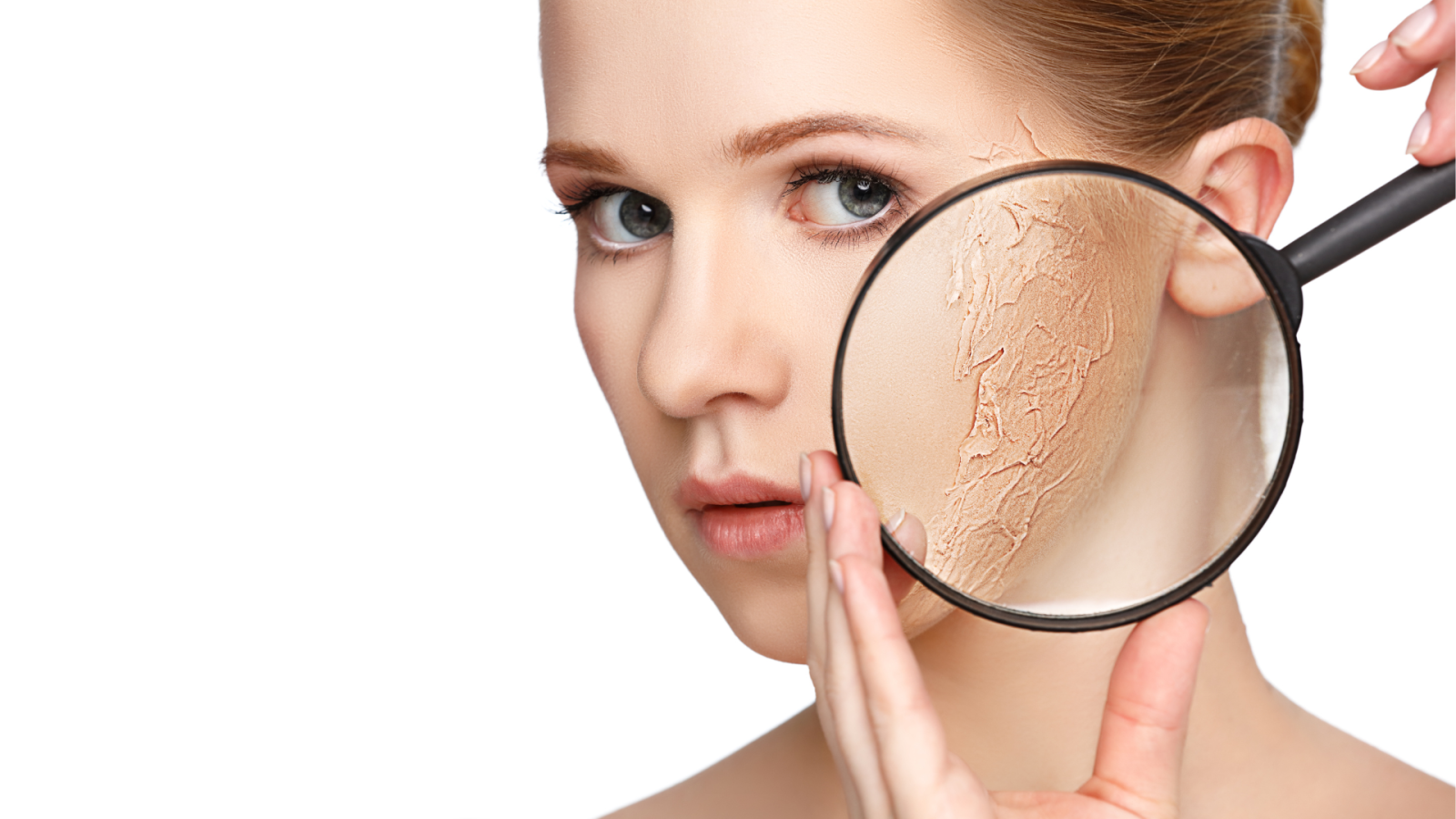Dry skin, despite moisturizing, can result from underlying issues like dehydration, harsh products, or environmental factors. Identifying the root cause is essential for effective treatment.
Dry skin is a common issue many people face, even with regular moisturizing. Various factors can contribute to this problem, making it important to address the underlying causes. Dehydration is a primary reason, as insufficient water intake affects skin hydration.
Environmental factors like cold weather, low humidity, and harsh winds can also strip moisture from the skin. Additionally, using products with harsh chemicals can damage the skin’s barrier, reducing its ability to retain moisture. Understanding these factors helps in choosing the right skincare routine to maintain healthy, hydrated skin.

Credit: www.riverchasedermatology.com
Common Causes Of Dry Skin
Dry skin can be frustrating and uncomfortable. Even after moisturizing, you might still experience dryness. Understanding the common causes can help you manage and prevent it.
Environmental Factors
The environment plays a significant role in skin health. Cold weather can strip your skin of its natural oils. Low humidity levels can make your skin feel dry and tight. Excessive sun exposure can also lead to dry skin.
| Environmental Factor | Effect on Skin |
|---|---|
| Cold Weather | Reduces skin moisture |
| Low Humidity | Causes skin dryness |
| Sun Exposure | Leads to dry, damaged skin |
Lifestyle Choices
Your daily habits can impact your skin. Hot showers can strip your skin of its natural oils. Using harsh soaps can also dry out your skin. Not drinking enough water can leave your skin dehydrated.
- Avoid hot showers; use lukewarm water instead.
- Choose gentle, moisturizing soaps.
- Drink at least eight glasses of water daily.
Small changes in your lifestyle can make a big difference. Keep your skin hydrated and healthy by considering these factors.
Identifying Underlying Health Issues
Sometimes, dry skin persists despite using moisturizer. This could be due to underlying health issues. Identifying these health concerns can help you find a better solution.
Medical Conditions
Certain medical conditions can cause persistent dry skin. These include:
- Hypothyroidism: Low thyroid hormone levels slow down metabolism. This affects skin hydration.
- Diabetes: High blood sugar levels can lead to dry skin. It affects skin hydration and healing.
- Psoriasis: This condition causes skin cells to build up rapidly. It results in dry, scaly patches.
- Eczema: Eczema causes inflammation and itchiness. It often leads to very dry skin.
Medications
Certain medications can also cause dry skin as a side effect. These include:
| Medication Type | Effect on Skin |
|---|---|
| Diuretics | Reduce fluid levels in the body. This can lead to dry skin. |
| Antihistamines | Often used for allergies. They can dry out the skin. |
| Retinoids | Common in acne treatments. These can cause skin dryness and peeling. |
| Statins | Used to lower cholesterol. They can sometimes dry out the skin. |
Choosing The Right Moisturizer
Finding the perfect moisturizer is crucial for combating dry skin. Not all moisturizers are created equal. Knowing what to look for can make a big difference.
Ingredients To Look For
The right ingredients can hydrate your skin effectively. Consider moisturizers with the following key components:
- Hyaluronic Acid: Helps retain moisture in the skin.
- Glycerin: Draws water from the air to your skin.
- Ceramides: Restores the skin barrier.
- Aloe Vera: Soothes and hydrates dry skin.
- Shea Butter: Deeply moisturizes and nourishes.
Types Of Moisturizers
Different skin types need different moisturizers. Here’s a quick guide:
| Skin Type | Recommended Moisturizer |
|---|---|
| Normal Skin | Light, water-based creams. |
| Dry Skin | Rich, oil-based creams or ointments. |
| Oily Skin | Gel-based, non-comedogenic moisturizers. |
| Combination Skin | Balancing, lightweight lotions. |
Choosing the right moisturizer involves knowing your skin type. Also, check the ingredients list. A good moisturizer can transform your dry skin.

Credit: prose.com
Effective Skincare Routine
Establishing an effective skincare routine is crucial for maintaining hydrated skin. Even if you moisturize regularly, you might still experience dryness. This can be due to an incomplete skincare regimen. A structured routine ensures your skin gets all the necessary nutrients and hydration it needs. Let’s explore a comprehensive skincare routine that includes daily and weekly treatments.
Daily Regimen
Your daily regimen should be simple yet effective. Follow these steps:
- Cleansing: Use a gentle, hydrating cleanser to remove dirt and impurities.
- Toning: Apply a toner to balance your skin’s pH levels.
- Serum: Use a hydrating serum with ingredients like hyaluronic acid.
- Moisturizing: Choose a rich, emollient moisturizer to lock in hydration.
- Sun Protection: Apply a broad-spectrum sunscreen to protect against UV rays.
Weekly Treatments
Weekly treatments can boost your skincare routine. Incorporate these practices:
- Exfoliation: Exfoliate once or twice a week to remove dead skin cells. This allows your moisturizer to penetrate better.
- Hydrating Masks: Use a hydrating mask once a week. Look for masks with ingredients like aloe vera or glycerin.
- Deep Conditioning: Apply a deep conditioning treatment to provide intense hydration.
| Skincare Step | Frequency | Key Ingredients |
|---|---|---|
| Cleansing | Daily | Gentle cleansers, Hydrating formulas |
| Toning | Daily | Alcohol-free toners, Soothing ingredients |
| Exfoliation | 1-2 times a week | AHA, BHA |
| Hydrating Masks | Weekly | Aloe vera, Glycerin |
| Deep Conditioning | Weekly | Intense hydrators |
Hydration And Diet
Dry skin can be frustrating, especially when you use moisturizers. One often overlooked factor is the role of hydration and diet. Proper hydration and a balanced diet are crucial for skin health. Let’s explore how these elements can help you achieve better skin hydration.
Importance Of Water
Drinking enough water is essential for maintaining skin hydration. Water helps to keep your skin cells plump and healthy. Without adequate water intake, your skin can become dry and flaky.
Experts recommend drinking at least 8 glasses of water daily. This helps to maintain your skin’s natural moisture balance. You can also consume water-rich foods like cucumbers and watermelon.
Consider setting reminders to drink water throughout the day. Staying hydrated can make a big difference in your skin’s appearance.
Nutrient-rich Foods
What you eat impacts your skin’s hydration levels. Nutrient-rich foods can enhance your skin’s moisture. Here are some foods to include in your diet:
| Food | Benefit |
|---|---|
| Avocados | Rich in healthy fats and vitamins |
| Salmon | High in omega-3 fatty acids |
| Nuts and Seeds | Provide essential fatty acids |
| Sweet Potatoes | High in beta-carotene |
| Green Leafy Vegetables | Rich in antioxidants and vitamins |
Incorporating these foods can improve your skin’s hydration. Aim to eat a variety of these nutrient-rich foods daily. They provide the essential nutrients your skin needs to stay healthy and hydrated.
By focusing on both hydration and diet, you can improve your skin’s moisture levels. Drink plenty of water and eat nutrient-rich foods for the best results.

Credit: www.kraussdermatology.com
Environmental Adjustments
Dry skin can be frustrating, especially when moisturizing doesn’t help. Environmental factors often play a significant role. Adjustments to your surroundings can make a big difference. Simple changes can help maintain your skin’s natural moisture.
Humidifiers
Using a humidifier can add moisture to the air in your home. This is especially useful in dry climates or during winter months.
- Place a humidifier in your bedroom.
- Keep the humidity level between 30-50%.
- Clean the humidifier regularly to prevent mold.
Temperature Control
Extreme temperatures can strip your skin of its natural oils. It’s important to keep your home at a comfortable temperature.
- Set your thermostat to a moderate temperature.
- Avoid hot showers; opt for warm instead.
- Wear layers to stay warm without overheating.
Making these environmental adjustments can help keep your skin hydrated. Small changes in your home can lead to big improvements in your skin health.
Avoiding Common Mistakes
Many people wonder, “Why is my skin so dry even when I moisturize?” The answer often lies in common mistakes that can sabotage your efforts. By recognizing these pitfalls, you can better nourish your skin and keep it hydrated.
Over-cleansing
Over-cleansing strips your skin of its natural oils. This can make your skin dry and flaky. Using harsh soaps can worsen the problem. Opt for a gentle, pH-balanced cleanser. Cleanse your face twice a day at most. Over-cleansing can disrupt your skin’s natural barrier. This makes it harder for your skin to retain moisture.
Hot Showers
Hot showers feel great but can dry out your skin. Hot water removes your skin’s natural oils. This leads to dry, itchy skin. Use lukewarm water instead. Limit your showers to 10 minutes. Pat your skin dry gently with a soft towel. Immediately apply moisturizer after your shower. This helps lock in moisture.
When To Seek Professional Help
Sometimes, moisturizing isn’t enough to fix dry skin. If your skin stays dry even after using good moisturizers, it might be time to seek professional help. Knowing when to visit a dermatologist can save you from discomfort and skin damage.
Dermatologist Visits
A dermatologist can help diagnose the root cause of your dry skin. They can also recommend treatments that are more effective than over-the-counter products.
Consider visiting a dermatologist if you notice any of the following:
- Red, inflamed skin
- Cracks or bleeding
- Severe itching
- Painful skin patches
These symptoms could indicate that your dry skin needs medical attention.
Signs Of Severe Conditions
Dry skin can be a sign of serious skin conditions. Knowing these signs can help you decide when to seek professional help.
| Condition | Symptoms |
|---|---|
| Eczema | Itchy, red patches |
| Psoriasis | Thick, scaly spots |
| Contact Dermatitis | Rash after touching an irritant |
If you experience these symptoms, see a dermatologist. Timely treatment can prevent complications.
Frequently Asked Questions
Why Is My Skin Dry Even After Moisturizing?
Your skin may be dry due to inadequate hydration, harsh skincare products, or underlying health conditions. Sometimes, the moisturizer you’re using isn’t suitable for your skin type.
What Is The Best Time To Apply Moisturizer?
The best time to apply moisturizer is right after showering. This helps lock in moisture. It’s also effective to apply it before bed to keep your skin hydrated overnight.
Can Diet Affect Skin Dryness?
Yes, diet can affect skin dryness. A lack of essential fatty acids, vitamins, and hydration can lead to dry skin. Eating a balanced diet helps.
Does Weather Change Cause Dry Skin?
Yes, weather changes can cause dry skin. Cold air and low humidity levels can strip your skin of moisture. Using a humidifier can help.
Conclusion
Finding the cause of dry skin is essential. Consistent moisturizing and identifying underlying issues can help. Consult a dermatologist if dryness persists. Proper skincare routines and hydration are key to healthy skin. Remember, everyone’s skin is different. Tailor your approach to suit your specific needs.








